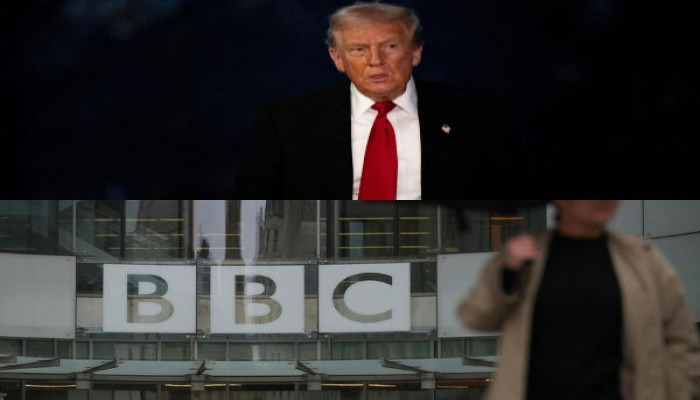Trump threatens $1 billion lawsuit against BBC over edited speech as broadcaster faces crisis
- In Reports
- 07:04 PM, Nov 11, 2025
- Myind Staff
U.S. President Donald Trump has threatened to take legal action against the BBC over the editing of a speech he made in 2021 on the day his supporters stormed the Capitol, which the British broadcaster admitted on Monday was an “error of judgment.”
Trump’s lawyers said that the BBC must withdraw its documentary by November 14 or face a lawsuit demanding “no less” than $1 billion, according to a letter sent on Sunday.
The BBC’s flagship Panorama programme had used edited clips from two different parts of one of Trump’s speeches, making it appear as though he was urging supporters to riot on January 6, 2021, which his lawyers called “false and defamatory.”
The revelation about the edit and the growing criticism of BBC News have thrown the organisation into crisis, leading to the resignation of its top two officials, Director General Tim Davie and Chief Executive of News Deborah Turness, on Sunday.
BBC chair Samir Shah apologised on Monday for the way the footage was edited but denied that the broadcaster’s news division had any systemic bias. He said the BBC was reviewing how it would respond to the legal threat.
The crisis began after the leak of an internal report written by a BBC standards adviser that raised questions about the organisation’s coverage, including the editing of Trump’s speech in a programme aired just before the November 2024 U.S. presidential election.
On the day of that speech, Trump supporters stormed the Capitol as Congress was set to certify Democrat Joe Biden’s victory in the November 2020 election.
The edited footage was part of a dossier leaked to the Daily Telegraph, which also included complaints about the BBC’s reporting on the Israel-Gaza war and transgender issues.
Shah said that the BBC accepted that the way the footage had been edited gave the impression that Trump had directly called for violence.
“The BBC would like to apologise for that error of judgement,” he said in a letter to lawmakers.
The letter from Trump’s lawyers claimed that the BBC had breached Florida’s defamation law by intentionally omitting facts and editing clips misleadingly to create a false impression of what Trump had said.
It is usually difficult for public figures like Trump to win defamation cases in the United States, as they must prove that the defendant knew or should have known the information was false but still published it.
Several U.S. media companies, including CBS and ABC News, have recently settled lawsuits filed by Trump.
While Shah accepted that the editing of the Trump speech was wrong, he rejected claims that the BBC had tried to hide any accusations of bias or ignored issues within its reporting. When asked if there was systemic bias, he said “yes,” the allegations were wrong.
He said that while there were individual mistakes and some underlying problems, the claim that the BBC was institutionally biased was not true.
“I’ve worked in BBC News,” he told the BBC. “I know that BBC News’ DNA and culture is to be impartial. It’s to provide the best news we can and the most trustworthy news.”
He told lawmakers that the BBC was determined to rebuild public trust and ensure its journalism met the highest standards of fairness.
A spokesperson for British Prime Minister Keir Starmer denied that the BBC was institutionally biased or corrupt and said the government continued to support the broadcaster.
“Clearly mistakes have been made in this case and the director general and Deborah Turness have taken responsibility for those mistakes,” the spokesperson said.
“What is important here is that the BBC maintains the high standards for which it is rightfully recognised internationally, and that’s very much our focus.”







Comments